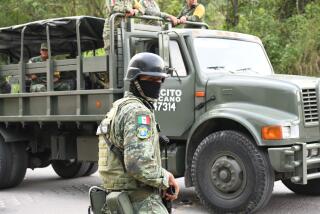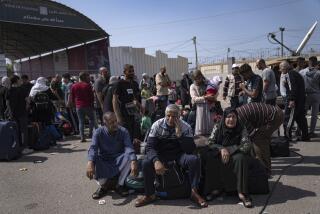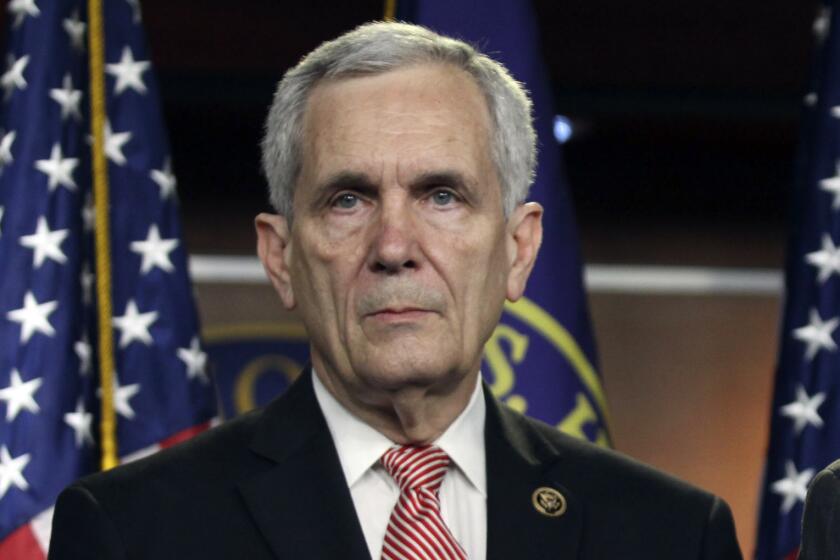Government Detentions Blamed : Simon, Mary, Fatimah: Vanishing S. Africans
Simon M., Mary D., Nazareth M., Fatimah S., Fikile M.--where are they?
Simon, a 15-year-old schoolboy, was sent to the store near his home in Soweto, outside Johannesburg, last Wednesday evening for bread, milk and jam. He has not returned. His parents are frantic with worry.
Mary, 20, a student leader in Soweto, told her mother on June 15 that she would be spending two nights at a girlfriend’s house and would be back last Tuesday morning. She has not come home yet.
Nazareth, 17, an altar boy at a Roman Catholic church outside Port Elizabeth, went to serve Mass on June 15 and was last seen being taken away from the church by three men.
Fatimah, an insurance clerk in her early 20s, went to a meeting on that weekend of an Indian cultural organization to which she belongs near Durban and did not return.
Fikile, a truck driver in his 40s, left for work on the morning of June 17 but, according to his Cape Town employers, never arrived, although he has a “superior attendance record.” Neither his foreman nor the company lawyer has been able to locate him despite checks with the police, local hospitals, the mortuary and all his known friends.
These five are among the hundreds, perhaps thousands, of South Africans who, according to the opposition Progressive Federal Party, have “disappeared” since President Pieter W. Botha imposed a national state of emergency June 12 and gave the police and army the authority to detain anyone without charge and hold him or her indefinitely.
“Security police are picking people up at their homes, places of work and off the street, and their next of kin are not being informed of their whereabouts,” Ray Swart, a Progressive Federal Party member of Parliament, charged last week.
He said there have been “thousands of disappearances” under the state of emergency and that they are continuing.
Families of the five all have been to the police in search of their relatives but in each case, the police did not say they were officially detained and offered no other answers. In the cases of Nazareth and Fatimah, they even took down details as they might for any “missing persons” case.
(Nevertheless, although the five have not been officially declared to be among the detainees, their last names have been withheld by The Times to comply with the South African government rules prohibiting publication of the names of detainees.)
The Progressive Federal Party established a “missing persons bureau” last week in Cape Town. It received more than 500 calls the first day and is now working on an around-the-clock basis, using computers to keep track of the multiplying reports.
To publicize the situation, the party’s members of Parliament are using the privileged legislative forum to demand information on people who have been detained or are simply listed as missing.
List of 1,034
Peter Soal, another Progressive Federal Party member of Parliament, cited a list of 1,034 persons believed detained, but he said the party’s reports suggest that this was probably not even half of those held by the police under the state of emergency.
That list, compiled at the middle of last week by the Detainees’ Parents Support Committee, which monitors detentions and advises the families of prisoners, includes the names of 255 political and community leaders, 115 students and teachers, 65 union officials, 44 clergymen and church workers, 12 journalists and about the same number of lawyers.
Three members of the Progressive Federal Party’s “unrest monitoring team” were detained but released after strong complaints from the party that the government had infringed upon legal activities of a recognized political party.
An analysis by the Detainees’ Parents Support Committee of the presumed but not confirmed detentions shows that more organizations were affected now than during the partial state of emergency imposed last July. It also shows that this crackdown reaches to many more outlying communities and rural areas to which the unrest has recently spread and that more lower-level activists, such as shop stewards and street committee chairmen, are being held.
The authorities appear to have worked from carefully compiled lists of anti-apartheid activists in the first detentions after the state of emergency was declared and are still seeking many people that they have missed. The Progressive Federal Party’s Graham McIntosh says they also seem to be involved “in a massive trawling exercise.” McIntosh, a member of Parliament, is in charge of the “missing persons bureau.”
“They take everything in the fish pond and throw back the ones they don’t want,” McIntosh said. “This way they hope to get the guys they are looking for.”
In one case over the weekend of June 14-15, everyone present at a Cape Town church prayer service was detained after the police said that the service was really an anti-government political meeting and thus prohibited.
The government information bureau, after first denying knowledge of the incident, said that 189 people were being held. On Sunday, the information bureau announced that about 150 had been released during the previous three days.
‘Soweto Uprising’
Another case cited by a Progressive Federal Party member of the President’s Council was that of a 17-year-old Cape Town high school student, Helene Thornton, who was arrested June 16 at a church service commemorating the 575 people killed in the “Soweto uprising”--11 months of intermittent black riots that began June 16, 1976.
The police had found a copy of a magazine published by the anti-apartheid United Democratic Front in her schoolbag and detained her, Progressive Federal member Robin J. Carlisle told the council. “This is a perfectly legal magazine, and I subscribe to it myself,” Carlisle said. “Does this mean I am going to be arrested too?”
Estimates last week by Amnesty International in London and international church groups in Geneva and New York put the number of detainees at more than 3,000. Calls are made from abroad almost daily demanding the release of prominent detainees, but emergency regulations prevent reporters here from reporting the names of any of those being held.
The government has refused either to identify those detained or even to say how many it is holding, declaring that “it is not in the state’s interest to do so.” After dismissing as “grossly exaggerated” reports that as many as 4,000 or 4,500 people have been detained, spokesmen now refuse to comment. The government has also prohibited any news reports on police activities beyond those announced by the government information bureau.
Pledge to Parliament
But Louis Nel, deputy minister in charge of information, assured Parliament that the police would inform the families of all those held under the emergency regulations. The government may also disclose the total number of detainees sometime in the future, he said.
The detentions are necessary, Nel said last week, to remove anti-apartheid activists from a “superheated situation,” to let political passions cool in the black community and to ensure that political moderates, which the government hopes to bring into negotiations on political reforms, will not be intimidated by militant blacks.
Even if the state of emergency were to be lifted, the detentions would likely continue, government ministers have told Parliament. The ruling National Party pushed through legislation last Friday that would enable the police, without a declaration of a state of emergency, to detain for up to six months anyone believed involved in civil unrest or likely to become involved.
Nel told journalists that, for the most part, the security police were acting on information of anti-government activities that they had long been gathering.
‘Other Reasons’
“No one has been arrested because he is a trade union leader,” Nel said in reply to widespread allegations abroad of a crackdown on black labor unions. “That is not the reason he has been arrested. If a trade union leader has been arrested, then it is for other reasons.”
Nel objected strongly, in Parliament and in talking to journalists, to the Progressive Federal Party’s charges that the “disappearances”--as the Progressive Federal Party’s Swart termed them--amount to a wave of terror intended to decimate anti-apartheid groups, whose leaders have reportedly been detained in large numbers, and to intimidate ordinary citizens.
Nel said that not only would families of detainees be advised of their whereabouts so that they could bring them clothing and spending money but that prisons and jails where they are held would be regularly inspected by judges and that medical care would be assured.
“The trouble is that almost nobody we have talked with has been officially informed that their relatives have been detained or told where they are being held,” Audrey Coleman of the Detainees’ Parents Support Committee said. “Because people have been given this assurance that they will be informed when a person has been detained, those families with missing persons who hear nothing from the authorities become all the more concerned. . . .
“Where are their sons and daughters, their husbands and wives? They don’t know. What has happened to them? Are they detained, are they safe, have they been hurt, are they alive? They don’t know, and when a person is missing in these circumstances it is very, very difficult to find out.”
Another factor, Coleman said, is that many activists are “in hiding, on the run, not sleeping at home or going to work,” and this “adds an element of uncertainty for their families, who don’t know whether a missed phone call means detention or simply that the callbox wasn’t working.”
Simon’s father, Petrus, a shipping clerk, went to the homes of all his son’s friends, then to local hospitals and clinics, then with reluctance to nearby police stations and, finally, with dread to the mortuary. No one knew his son’s whereabouts.
“I was told to go home and wait and that if my son had been detained I would be informed,” he said. “We are still waiting, and not knowing is very, very hard.”
When Nazareth did not return from church, his mother and three older brothers went looking for him and found fellow parishioners who said they had seen three men, apparently armed, put him and several other youths into a white van and drive off.
No Information
With this account, they went to the authorities but were told that no information was available on the incident, his brother Michael said.
“Our mother is so scared that he has been killed that I think she would be almost relieved if she were told Nazareth has been detained,” Michael added.
Coleman, whose own activist sons have been detained in the past, commented: “When a person is missing, detention is only one possibility. There are (pro-government) vigilante groups that have been attacking activists in the (black) townships. There are criminals who may kill in the course of ordinary crime. There is also the possibility of accidents, and all the other things any parent worries might happen to a child.”
South Africa bulldozes Crossroads shanties. Page 6.
More to Read
Start your day right
Sign up for Essential California for news, features and recommendations from the L.A. Times and beyond in your inbox six days a week.
You may occasionally receive promotional content from the Los Angeles Times.






